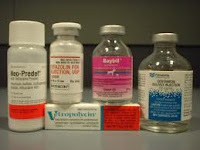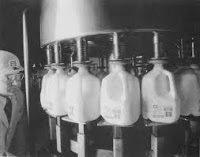host: is an organism that provides food for a parasite.
parasite: is an organism that lives in or on another living thing and gets food from it.
interferon: is a chemical substance that interferes the way viruses reproduce.
vaccine: are substances made from wakened or dead viruses.
bacteria: are very small, one-celled monerans.
capsule: some bacteria have a sticky outer layer.
flagellum: some bacteria move with a long, whiplike thread.
fission: is the process of one organism dividing into two organisms.
asexual reproduction: is the reproducing of a living thing from only one parent.
endospore: is thicky-walled structure that forms inside the cell.
saprophytes: are organisms that use dead material for food.
decomposers: are living things that get fet their food from breaking down dead matter into simpler chemicals.
Koch's postulates: are steps for proving that a disease is caused by a certain microscopic organism.
communicable diseases: are ones that can be passed from one organism to another.
biotechnology: is the use of living things to solve practical problems.
pasteurization: the process of heating milk to kill harmful bacteria.
blue-green bacteria: are small, one-celled monerans that contain chlorophyll and can make their own food.





















No hay comentarios:
Publicar un comentario